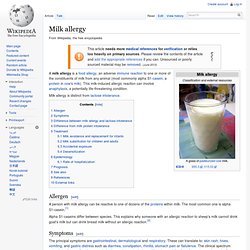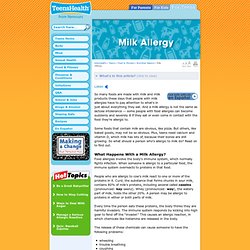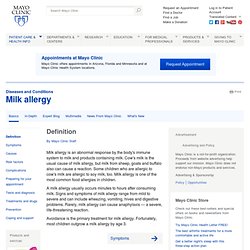

Milk allergy. A milk allergy is a food allergy, an adverse immune reaction to one or more of the constituents of milk from any animal (most commonly alpha S1-casein, a protein in cow's milk).

This milk-induced allergic reaction can involve anaphylaxis, a potentially life-threatening condition. Milk allergy is distinct from lactose intolerance. Allergen[edit] A person with milk allergy can be reactive to one of dozens of the proteins within milk. The most common one is alpha S1-casein.[1] Alpha S1-caseins differ between species. Symptoms[edit] The symptoms may occur within a few minutes after exposure in immediate reactions, or after hours (and in some cases after several days) in delayed reactions. Difference between milk allergy and lactose intolerance[edit] Milk allergy is a food allergy, an adverse immune reaction to a food protein that is normally harmless to the non-allergic individual. Difference from milk protein intolerance[edit] Treatment[edit] Milk avoidance and replacement for infants[edit]
Milk Allergy. Listen Living With a Milk Allergy It may be challenging to eliminate milk from your diet, but it's not impossible.

Because most people don't get enough calcium in their diets even if they do drink milk, many other foods are now enriched with calcium, such as juices, cereals, and rice and soy beverages. But before you eat or drink anything calcium enriched, make sure it's also dairy free. Milk and milk products can lurk in strange places, such as processed meats. Manufacturers of foods sold in the United States must list on their labels whether a food contains any of the most common allergens. This new labeling requirement makes it a little easier than reading the ingredients list — instead of needing to know that the ingredient "hydrolyzed casein" comes from milk protein, you should be able to tell at a glance which foods to avoid.
Some ingredients and foods that contain milk are: Vegan foods are made without animal products, such as eggs or milk. Milk Allergy Products, Ingredients, and Milk Substitutes. Why do I need to register or sign in for WebMD to save?

We will provide you with a dropdown of all your saved articles when you are registered and signed in. Use this list to check food labels for cow's milk or milk products. Also, ask your doctor if sheep and goat's milk are safe. For most people with a milk allergy, the answer is no -- the proteins in sheep and goat’s milk are similar to those in cow’s milk and also cause a reaction. Don't get lactose intolerance confused with a milk allergy. Recommended Related to Allergies Staying Active and in Control Despite Their Allergies For people who have allergies, the challenges of remaining physically active can easily outweigh the benefits to their health and mental well-being. Read the Staying Active and in Control Despite Their Allergies article > > Dairy Products to Avoid Foods With Milk in Them These foods often contain cow's milk protein.
Ingredients With Milk If you see these listed on a label, the food has milk proteins in it: Milk allergy Definition. Milk allergy is an abnormal response by the body's immune system to milk and products containing milk.

Cow's milk is the usual cause of milk allergy, but milk from sheep, goats and buffalo also can cause a reaction. Some children who are allergic to cow's milk are allergic to soy milk, too. Milk allergy is one of the most common food allergies in children. A milk allergy usually occurs minutes to hours after consuming milk. Signs and symptoms of milk allergy range from mild to severe and can include wheezing, vomiting, hives and digestive problems.
Avoidance is the primary treatment for milk allergy. SymptomsAug. 11, 2011 References.